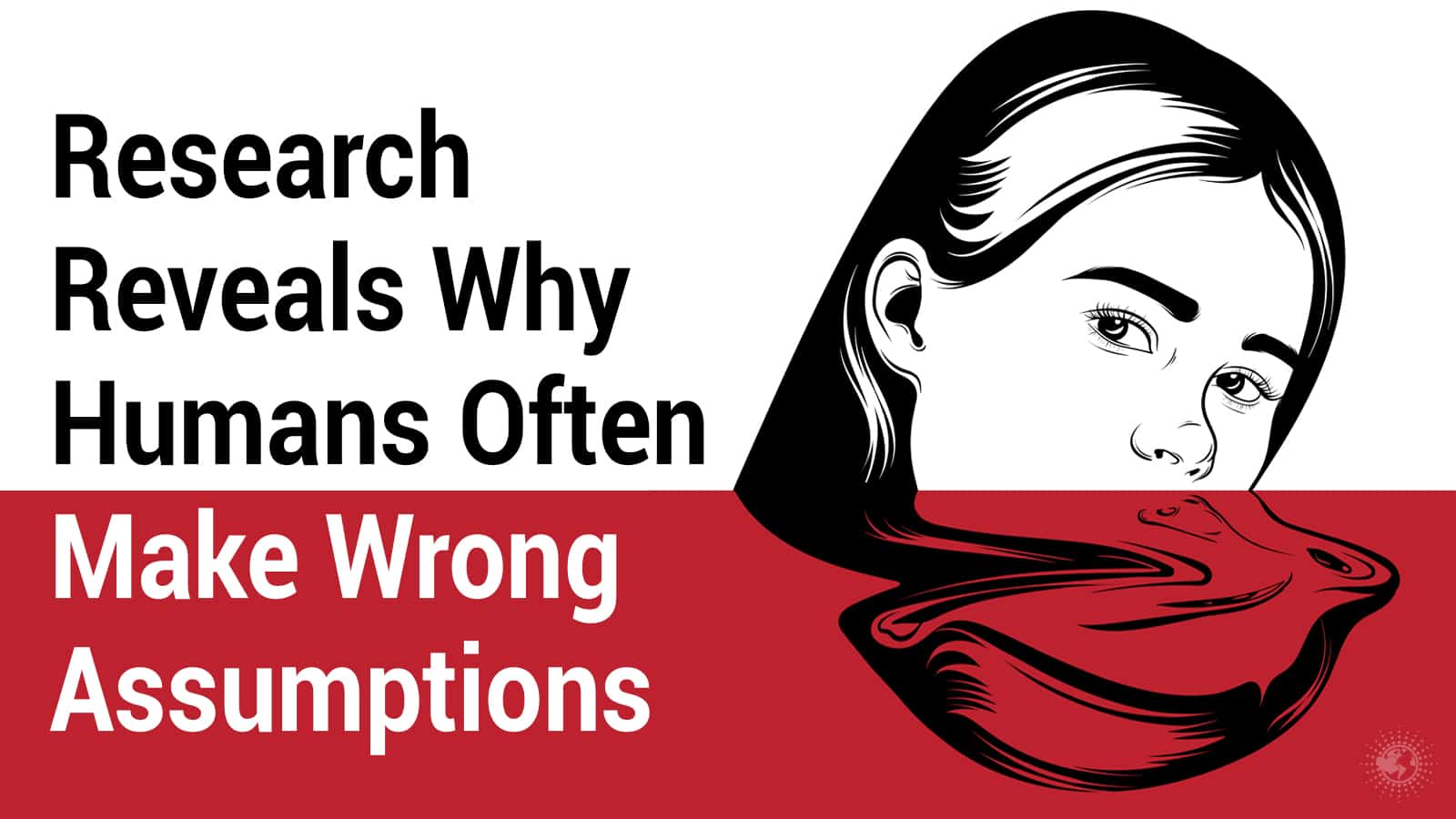An assumption is a statement consisting of a belief or concept that is accepted to be the truth, even though there is no actual evidence that indicates its reality. It means coming up with explanations for things without any real reason to believe in those explanations.
To some degree, assumptions can be harmless. But repeatedly making these assumptions time and time again is awful for your mental health. When you’re constantly assuming, you’re not grounded in reality, and your ideas of the world around you are very much obscured and clouded by falsehood.
Your mental health can be affected by the assumptions that you make. One of the commonly affected aspects is self-esteem, which refers to a personal view of your value and capabilities. It seems that the more assumptions you make, the more likely your self-esteem is to crumble.
But why does that happen? Can it be helped? Is it possible to fight off a habit of making assumptions, especially if you have an anxiety-based disorder? And, honestly, how does self-esteem even factor into this? To explain this topic, here are five ways making assumptions can hurt your self-esteem.
1. Assumptions Lead To Stress
When you make assumptions, you’re opening yourself up to undue stress. You’re coming up with all sorts of ideas for why something may go wrong or how someone might have an issue with you, but you don’t know if any of that is true. Worse still, this will affect your self-esteem! For example, consider:- Your boss asks you to come in for a chat. You immediately begin making assumptions that you’re going to be fired, and you wonder where you went wrong and how you’ll recover from this financial blow. But it turns out that your boss just wanted to ask about upcoming reports, and you’re not being fired at all.
- Your friend has been acting a little distant lately. You make an assumption that you have done something to upset them and that they hate you now, and you wonder if you’re an awful person or an unworthy friend. But it turns out that they were going through a personal issue and weren’t feeling up to interaction.
- Your partner has been on their phone a lot and hid their screen from you the last time you came to look at what they were doing. You jump to an assumption that they’re cheating, and you start snooping to find evidence. In the process, you feel terrible and wonder if you’re unworthy or not attractive enough to hold your attention. But it turns out that your partner was gift shopping for you on their phone and didn’t want you to see to ruin the surprise.
Your assumptions are entirely wrong in all these situations, easily avoidable with communication, and packed with stressful energy. All that stress will deplete your positive thinking and self-esteem over time, and studies have found that these factors are all closely linked. Why put yourself through that kind of panic?
2. Assumptions Make Things Harder For You – For No Reason
A lot of your self-esteem comes from your confidence in your capabilities and strengths – and you don’t exactly keep them going well when you make assumptions. This is because beliefs take away from your abilities and increase your risks of failure, which can damage your self-esteem when you have to take blow after blow. Ideally, you’d learn from your mistakes each time, but with assumptions in the mix, that can be hard to do. Here is how assumptions may make things harder for you:
· You Miss Opportunities
Assumptions can make you underestimate yourself or gain incorrect impressions of others. Combined, this can cause you to miss out on a significant number of opportunities. You don’t apply for jobs because you assume you won’t get them. Or perhaps you don’t connect with someone because you assume they aren’t interested in you. You can miss out on so much when you keep assuming things, and it’s not worth the mistake!
· You Make Hurdles
When you assume certain things are problems and don’t take the time actually to check if they are, you wind up trying to circumvent or protect yourself from imagined hurdles that aren’t even there. Even if there are challenges ahead, making assumptions means you have a fair chance of guessing incorrectly about what those challenges will be. And of course, there is always the chance that there won’t be any hurdles – so why invent them?
· You Box Your Creativity In
Assuming that there’s only one way to do something means you never get to think outside of the box. And when that one tried, and the proper method goes down for whatever reason, you’re stuck and confused, unsure how to make things work. To limit your creativity is to determine the options that you have and make things harder for yourself.
3. Assumptions Can Set You Up For Rude Awakenings
Most people’s assumptions indeed have to do with negative beliefs, but sometimes assumptions can be made about good things instead. You can become overconfident and have a dangerous level of positive thinking when you assume everything is going exactly your way. As that old saying goes, you shouldn’t be counting your chickens before they hatch!
Overconfidence doesn’t seem like the worst trait, but all pride will lead to a downfall eventually. There will come the point where you will meet with a reality that shattered your overconfidence and your expectations, sending your self-esteem plummeting down a dark hole.
Worse still, assumptions that lead to overconfidence are typically cycles that are difficult to break out of, leading to even more assumptions. You’ll have an entire stack of them piled up before you get your rude awakening, which is even worse for your self-esteem. This is because:
- You feel overconfident due to an overflow of toxic positivity, which has caused you to make assumptions on that high.
- Being overconfident makes you begin to take things for granted, which damages your life and your chances and opportunities as you make more mistakes and miss crucial details.
- In your overconfidence that is naturally more careless, you are also less likely to note any signs that something terrible will happen.
4. Assumptions Are “Lazy.”
Laziness as a concept doesn’t mean what people think it means. Many people define it as an unavoidable trait, saying that someone lazy is irredeemable and can’t ever do work or tasks efficiently.
But in reality, laziness doesn’t exist in that manner. According to studies, it’s a cover for other underlying issues, and a lot of these issues stem from poor self-esteem. By continuing to make assumptions out of so-called laziness, you are perpetuating your poor self-esteem and even fostering it, as if you’re encouraging yourself to feel worse!
Here are some ways that assumptions are “lazy” – or, more specifically, a product of poor self-esteem:
· Assumptions Are An Easy Out
When you make assumptions, you meet no resistance and carry along on your way without learning, growing, or asking. This means you don’t get the chance to improve yourself, which can further damage your self-esteem when you don’t see your life’s trajectory moving.
· Assumptions Stop The Gathering Of Knowledge
The act of learning means getting up, cleaning the air, and asking questions. Jumping to conclusions is an easy action that doesn’t give you any of the information that you genuinely need in life. It’s lazy, and it’s no good for your mental health.
· Assumptions Make You Ignore Responsibility
When you make assumptions, you’re choosing to put up a fake version of reality and hide behind it. In real life, you’d have to get off your behind and take ownership of the life you’re living and the things you’ve done. Hiding behind the act of blaming others is “lazy” behavior rooted in self-esteem problems, and when you lean into them, you send the spiral down further.
5. Assumptions Make You More Negative
To have positive self-esteem, you also need to have a lot of positive thinking. Optimism is one of the critical factors of good self-esteem because it teaches you to find good things about yourself and love yourself more than before.
Unfortunately, the act of making assumptions can damage these kinds of efforts. You become a more negative person when you make assumptions, and you develop a negative mindset that focuses on worst-case scenarios and unfounded beliefs about what will happen next. This is terrible for your self-esteem! Here are some reasons that assumptions make you more negative:
· Assumptions Are Toxic
Assumptions are the opposite of open communication and the opposite of self-improvement drives. It’s draining to assume the worst of everyone constantly. Besides, it’s tiring for others to be around someone who’s always assuming things about them. You’ll push many people away because of your assumptions, and being alone is always a blow to self-esteem.
· Assumptions Trap You In The Past
Many assumptions are born out of adverse circumstances from one’s past. When you use those experiences to fuel your expectations and assumptions, you’re essentially imprisoning yourself with these ways of thinking. You can’t move on from things that hurt you, nor can you heal self-esteem damaged by that if you make assumptions.
· Assumptions Are A Cycle of Negativity
As previously mentioned, assumptions often manifest in a cycle. They become a bad habit that is hard to break out of, especially if making assumptions has paid off for you in the past.
Final Thoughts On Some Ways Making Assumptions Can Hurt Your Self-Esteem, And How To Prevent It
While assumptions may occasionally be valid, most of the time, they aren’t. And if that’s the case, then why would you want to spend any time making them? They harm your self-esteem, relationships, stress levels, and opportunities, after all.
Naturally, it’s not as easy as it sounds to break free from assumptions. Learning to face the root cause of why you make assumptions can be helpful in overall recovery. Don’t be afraid to speak to a mental health professional, such as a counselor or therapist, about this if needed. It will take time for you to unlearn the habit of assumption-making. But your self-esteem will thank you when those quirks are no longer present!

















 Community
Community

